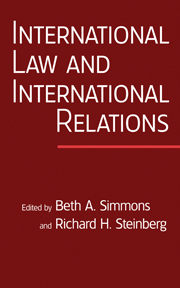Book contents
- Frontmatter
- Contents
- Contributors
- Abstracts
- Preface
- Editors' Note
- PART I INTERNATIONAL REGIMES THEORY: DOES LAW MATTER?
- PART II COMMITMENT AND COMPLIANCE
- PART III LEGALIZATION AND ITS LIMITS
- PART IV INTERNATIONAL LAW AND INTERNATIONAL NORMS
- 10 Quasi-States, Dual Regimes, and Neoclassical Theory: International Jurisprudence and the Third World (1987)
- 11 Which Norms Matter? Revisiting the “Failure” of Internationalism (1997)
- 12 The Territorial Integrity Norm: International Boundaries and the Use of Force (2001)
- PART V TREATY DESIGN AND DYNAMICS
- PART VI LAW AND LEGAL INSTITUTIONS
- PART VII OTHER SUBSTANTIVE AREAS OF INTERNATIONAL LAW
- References
- Index
11 - Which Norms Matter? Revisiting the “Failure” of Internationalism (1997)
Published online by Cambridge University Press: 05 June 2012
- Frontmatter
- Contents
- Contributors
- Abstracts
- Preface
- Editors' Note
- PART I INTERNATIONAL REGIMES THEORY: DOES LAW MATTER?
- PART II COMMITMENT AND COMPLIANCE
- PART III LEGALIZATION AND ITS LIMITS
- PART IV INTERNATIONAL LAW AND INTERNATIONAL NORMS
- 10 Quasi-States, Dual Regimes, and Neoclassical Theory: International Jurisprudence and the Third World (1987)
- 11 Which Norms Matter? Revisiting the “Failure” of Internationalism (1997)
- 12 The Territorial Integrity Norm: International Boundaries and the Use of Force (2001)
- PART V TREATY DESIGN AND DYNAMICS
- PART VI LAW AND LEGAL INSTITUTIONS
- PART VII OTHER SUBSTANTIVE AREAS OF INTERNATIONAL LAW
- References
- Index
Summary
International relations theorists have in recent years shown an interest in international norms and rules not equaled since the interwar period. This contemporary literature is, of course, quite different – ie., better – than that of the 1920s and 1930s: it has greater intellectual depth, empirical backing, and explanatory power. The promise of this research, bolstered by the opportunities of the post–cold war era, is that norms encouraging free trade, protecting the environment, enhancing human rights, and controlling the spread and use of heinous weapons may have a substantial impact on the conduct and structure of international relations. But pessimists also exist. Some have taken up the stick E. H. Carr skillfully shook at idealists in an earlier period, arguing that the anarchic power-shaped international arena is not so malleable and that international norms and institutions have relatively little influence. On the one hand, we are pointed to the centrality of international norms; on the other, we are cautioned that norms are inconsequential. How do we make sense of these divergent claims? Which is right?
I argue that neither of the polarized positions is sustainable. Contrary to what the skeptics assert, norms do indeed matter. But norms do not necessarily matter in the ways or often to the extent that their proponents have argued. The literature on norms has generally misspecified their impact because of several conceptual and methodological biases.
- Type
- Chapter
- Information
- International Law and International RelationsAn International Organization Reader, pp. 233 - 258Publisher: Cambridge University PressPrint publication year: 2007



